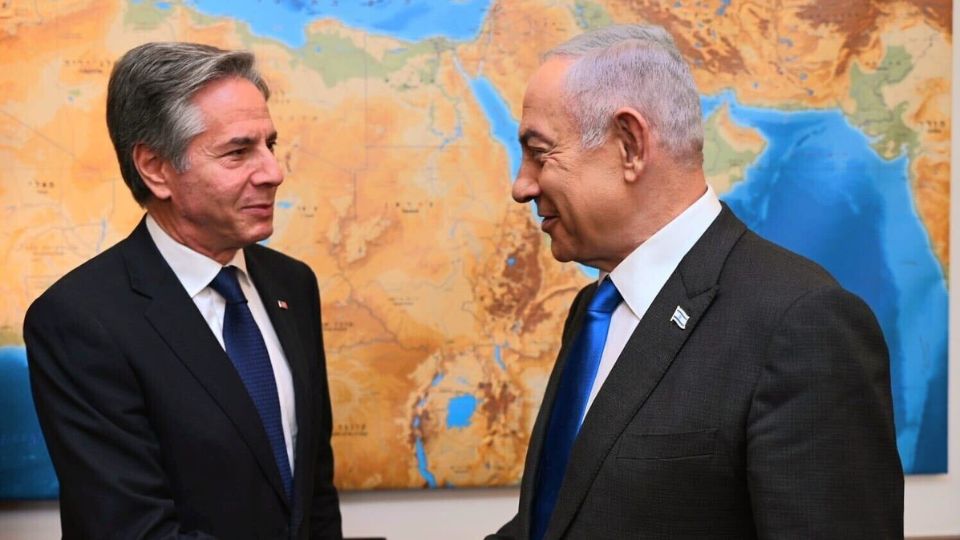The Israeli prime minister, Benjamin Netanyahu, reportedly informed Antony Blinken that he would not agree to a ceasefire and hostage deal that included ending the war in Gaza. This conversation took place during a visit by the US secretary of state, who advocated for providing more aid to Gaza and an immediate truce.
Mr. Blinken visited Jerusalem and met with Mr. Netanyahu. This was the last stop on his recent diplomatic tour of the Middle East. This is his seventh time visiting a region that has been severely affected by conflict for several months.
Israel put a very strict blockade on Gaza and attacked it very strongly in response to the Hamas attack on southern Israel on October 7th. About 1,200 people were killed and another 250 were taken hostage. Palestinian health officials report that Israel’s bombing has resulted in the deaths of over 34,000 individuals. According to the UN, almost half of the population is experiencing severe hunger.
During a meeting in Jerusalem that lasted for two and a half hours, Mr. Blinken emphasized the need to speed up and continue delivering aid to Gaza. He also discussed the ongoing efforts to achieve an immediate ceasefire and a deal for exchanging hostages.
He is going to visit Ashdod port in the south. The port has recently started receiving aid for Gaza because of a lot of pressure from around the world. Israeli officials informed the media that Mr. Netanyahu clearly stated in the meeting that he would not agree to any hostage deal that required the war to end.
Also Read: Legal Experts React to SCOTUS on Trump Immunity Case
“He told Blinken that we want to make an agreement and are committed to removing Hamas,” one official told The Times of Israel. Israel sent its most recent proposal to Hamas through Egyptian mediators last week. They are now waiting for a response, which is expected on Wednesday evening.
Mr. Blinken has accused Hamas of obstructing the agreement and has urged them to accept a truce deal that he considers to be very generous. The current draft proposes the release of 33 hostages in exchange for a larger number of Palestinian prisoners and a cessation of the fighting. The expectation is that there could be progress made towards a more complete agreement in the future.
“The time is now,” Mr. Blinken said on Wednesday. During a meeting in Tel Aviv, he told Israeli president Isaac Herzog that they are determined to achieve a ceasefire to bring the hostages back home. The only reason this may not be achieved is because of Hamas.
“There is a proposal being discussed, and, as we have mentioned, there will be no delays or excuses,” he said. He also mentioned that the deal would enable much-needed food, medicine, and water to enter Gaza.
Also Read: ‘Frustrated’ Ex-trump Aide Won’t Vote for Former President
After meeting with Mr. Herzog and the families of Americans held by Hamas at his hotel, Mr. Blinken briefly greeted several dozen demonstrators who had gathered outside. The demonstrators were calling for an immediate hostage release deal.
A high-ranking member of Hamas stated that the group is currently examining the proposed agreement. However, they criticized Mr. Blinken for not showing respect to both parties and referred to Israel as the main obstacle.
“Blinken’s comments go against what is true,” said Sami Abu Zuhri to Reuters.
Mr. Blinken is visiting Israel before an anticipated military operation in the southern city of Rafah. Rafah is the only remaining refuge for over 1.5 million displaced people in the small strip of land, many of whom are living in tents. During his visit to Israel, Mr. Blinken strongly emphasized the United States’ stance on an attack on Rafah.
President Joe Biden has stated clearly in interviews that if Israel does not take action to address civilian harm, humanitarian suffering, and the safety of aid workers, it could cause a change in US policy. He referred to this as a “red line” that should not be crossed.



Leave a Reply